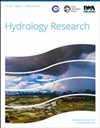基于改进Morris法的双拉丁超立方采样水文模型参数敏感性分析
IF 2.4
4区 环境科学与生态学
Q2 Environmental Science
引用次数: 1
摘要
水文模型参数的灵敏度分析是水文模拟定标过程中的关键环节。本文针对新安江模型10个参数的全局灵敏度分析,提出了双拉丁超立方体采样的Morris改进方法。此外,基于模型参数的速率验证,对局部灵敏度进行了分析。结果表明,深层蒸发系数(C)、自由蓄水量(SM)、不透水面积占流域总面积的百分比(IMP)、自由储水量曲线指数(EX)、地下水流出系数(KG)和地表径流消减因子(KKG)等参数均小于0.01,是不敏感的参数;关于蒸发转换因子(K)和存储容量曲线(B)的平方倍的参数在[0.01,0.1]的范围内,是不太敏感的参数;土壤流出系数(KSS)参数在[0.1,0.2]范围内,是一个低灵敏度参数;中层土壤流参数消减系数大于1,为高灵敏度参数;改进的Morris方法更好地反映了参数之间相互作用的存在。该研究成果为水文模型参数的敏感性分析提供了一种新的技术途径。本文章由计算机程序翻译,如有差异,请以英文原文为准。
Sensitivity analysis of hydrological model parameters based on improved Morris method with the double-Latin hypercube sampling
Sensitivity analysis of hydrological model parameters is a crucial step in the calibration process of hydrological simulation. In this paper, the improved Morris method with the double-Latin hypercube sampling is proposed for global sensitivity analysis of 10 parameters of the Xin'anjiang model. In addition, the local sensitivity is analyzed based on the rate validation of the model parameters. In general, the results show those parameters about evaporation coefficient in the deep layer (C), free water storage capacity (SM), impervious area as a percentage of total watershed area (IMP), free water storage capacity curve index (EX), groundwater outflow coefficient (KG) and subsurface runoff abatement factor (KKG) are all less than 0.01, insensitive parameters; the parameters about evaporation conversion factor (K) and square times of the storage capacity curve(B) are in the range of [0.01, 0.1], less sensitive parameters; the parameter about flow out coefficient in soil (KSS) is in the range of [0.1, 0.2], a low-sensitivity parameter; the parameter abatement coefficient of mid-soil flow (KKSS) is greater than 1, a high-sensitivity parameter; the improved Morris method better reflects the existence of interactions between parameters. This research result provides a new technical approach for the sensitivity analysis of hydrological model parameters.
求助全文
通过发布文献求助,成功后即可免费获取论文全文。
去求助
来源期刊

Hydrology Research
Environmental Science-Water Science and Technology
CiteScore
5.30
自引率
7.40%
发文量
70
审稿时长
17 weeks
期刊介绍:
Hydrology Research provides international coverage on all aspects of hydrology in its widest sense, and welcomes the submission of papers from across the subject. While emphasis is placed on studies of the hydrological cycle, the Journal also covers the physics and chemistry of water. Hydrology Research is intended to be a link between basic hydrological research and the practical application of scientific results within the broad field of water management.
 求助内容:
求助内容: 应助结果提醒方式:
应助结果提醒方式:


